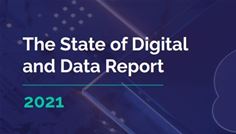UKCloud survey shows overwhelming desire to harness innovative technology that is hampered by lack of certainty over data residency.
UKCloud’s, the multi-cloud experts dedicated to making transformation happen across UK public sector, has announced the results of a survey of more than 300 senior IT professionals and business leaders that reveals the key challenges and issues that the UK Public Sector is facing in harnessing value from its data.
Recommended ITech News: Cologix & Telia Carrier Expand Partnership in Western Canada to Drive High Capacity at the Edge

One of the most emphatic responses from UKCloud’s State of Digital and Data survey is that 97% of UK public sector respondents are, at the very least, evaluating digital technology and its potential to improve the outcomes and services being delivered to citizens. This chimes with the recently updated National Data Strategy which express a clear desire for the nation to use its valuable datasets to fuel innovation. So, given there is clear alignment of the digital aspirations of public sector organisations, UKCloud’s survey discovered some of the key challenges that are hampering progress:
Recommended ITech News: Opsera Raises $15 Million Series A Funding to Lead Continuous Orchestration of DevOps and Software Delivery
Skills and Capability
Only half (52%) of those surveyed believe they have the resources necessary to understand and drive efficiencies from the data they have, meaning they can’t determine its true value. And a large majority (67%) of public sector organisations currently allocate no more than a few days each month for employees to innovate and research ways to unlock more value from data, suggesting there just isn’t enough time for them to discover new ways of working. Fortunately, there is growing awareness across public sector of the benefits of tapping into the capabilities and innovation of the UK tech sector with more than half (55%) of those surveyed say their organisation recognises the social value benefits of using specialist British partners to help it safely adopt digital technologies.
Dark Data
It is widely accepted and stated as a key pillar in the National Data Strategy that responsibility and availability are essential to drive genuine and sustainable value from data, and Secretary of State for Health and Social Care Matt Hancock’s latest speech at Digital Health Rewired discussed a desire to create a ‘consistent cloud platform’ for patient data. UKCloud’s survey calls the feasibility of that ambition into question as it reveals a knowledge gap – Organisations don’t seem to know where their data is, they just think they do. When asked where the majority of their data resides, those surveyed demonstrated genuine uncertainty by providing contrary responses. The split between survey answers suggests a lack of complete data oversight. With similar numbers believing that the majority of their data is in public cloud, on-premises and on both – which can’t be true within a single organisation – this suggests that the industry is actually still unsure about where data resides and that oversight in certain positions is lacking and suggests UKPS are not treating data as a national asset. Another concern the results raised is that 46% were not sure if they had reviewed their use of public cloud based on the recent Schrems II judgement, meaning data could still be heading to the US without the subject’s knowledge. The survey also revealed a lack of knowledge and tools, which could be impacting the delivery of services and indeed this growing ambition for innovation. The mix of responses here show that UKPS could unconsciously become locked-in.
Recommended ITech News: Latency-Aware Optical Networking for Automated Deployment of 5G Services
Collaboration
The need to continue to operate despite the national lockdown is clear evidence that collaboration is also a key driver for digital and data. The third pillar of the National Data Strategy states that there needs to be, “better coordination, access to and sharing of data of appropriate quality between organisations in the public, private and third sectors”. UKCloud’s survey showed broad support, as almost the majority (62%) of organisations say being able to use data to its full value, when it comes to collaborating internally, is essential to providing better services. However, forty-five percent of organisations said they’re not confident that they can safely and easily share data to effectively collaborate with partners and other agencies, and almost two-thirds (63%) confirmed that their organisation still stores data in various forms (such as paper-based archives) which make it difficult to extract value. Half (50%) of those surveyed also said that sharing and collaboration is made difficult by compliance and security restrictions.
“The survey highlights the continued tension that exists between cloud adoption and the perception that such adoption leads to an increase in cyber risk. In reality, these two factors are not inextricably linked. Cloud adoption can positively reduce risk, as many of the controls that are baked into a modern cloud platform are more comprehensive and better managed than those in on-premises equivalents. However not all data is created equal, so organisations should apply a sense of proportionality when considering where and when cloud is the right option,” said Mark Jackson, National Cybersecurity Advisor, Cisco UK & Ireland.
Recommended ITech News: Snyk to Provide Developer-First Security in Atlassian Bitbucket Cloud
UKCloud’s has long supported the ‘government’s wider ambition for a thriving, fast-growing digital sector in the UK, underpinned by public trust’ as set out by the Secretary of State for Digital, Culture, Media and Sport Oliver Dowden. The State of Digital and Data Survey reveals the majority (55%) believe public sector data should be protected to a higher standard than commercial data, yet a worrying 43 percent aren’t confident that their organisation’s data is stored appropriately for its security classification. With 53% of respondents showing concern about over-reliance on Big Tech, education is clearly necessary on why, as a national asset, it’s vital that public sector data is kept safe and sovereign where it can be protected under the UK’s The Data Protection Act.
Leighton James, CTO at UKCloud said, “In 2020, our State of Cloud adoption survey really helped organisations across public sector begin to understand and address the blockers to cloud adoption. This year, I believe our State of Digital and Data survey will have a similar positive impact for public sector organisations and their industry partners. This survey shows that the UK public sector is committed to the benefits of digital transformation, and it is also clear that this transformation is too big a leap for many organisations. UKCloud, and our innovative partners, are focused on bridging that gap by delivering services and capabilities that are specifically developed to address the actual challenges facing most public sector organisations. I believe our latest survey will once again help our community understand and address these challenges in order to deliver better outcomes to those that rely on public services.”
Recommended ITech News: Nintex Helps Organizations Accelerate Digital Business Transformation with Pre-Built Configurable Process Maps and Automation Templates


